Unit 4 Don't eat in class. Section A (Grammar focus--3c) 课件(共42张PPT,无音频)
文档属性
| 名称 | Unit 4 Don't eat in class. Section A (Grammar focus--3c) 课件(共42张PPT,无音频) | 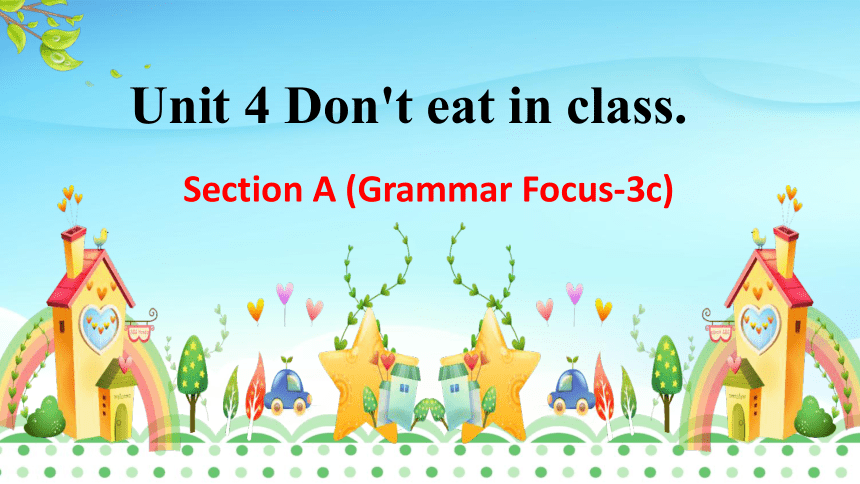 | |
| 格式 | zip | ||
| 文件大小 | 2.9MB | ||
| 资源类型 | 教案 | ||
| 版本资源 | 人教新目标(Go for it)版 | ||
| 科目 | 英语 | ||
| 更新时间 | 2021-03-25 11:14:11 | ||
图片预览

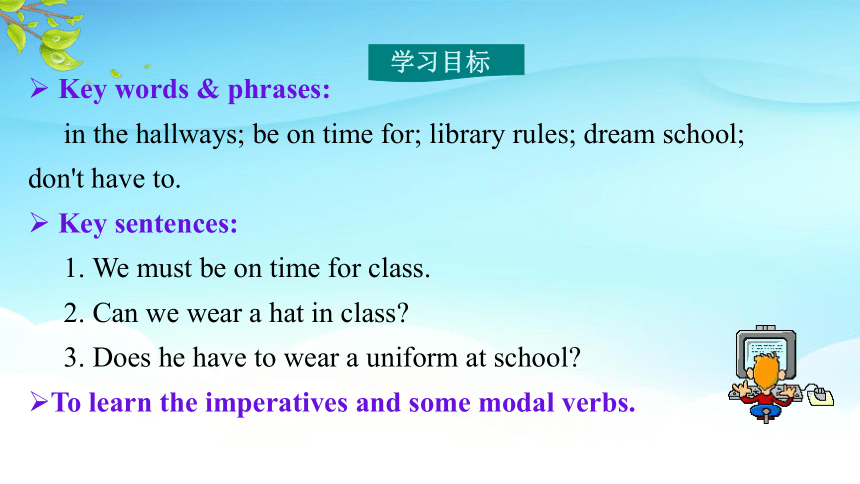
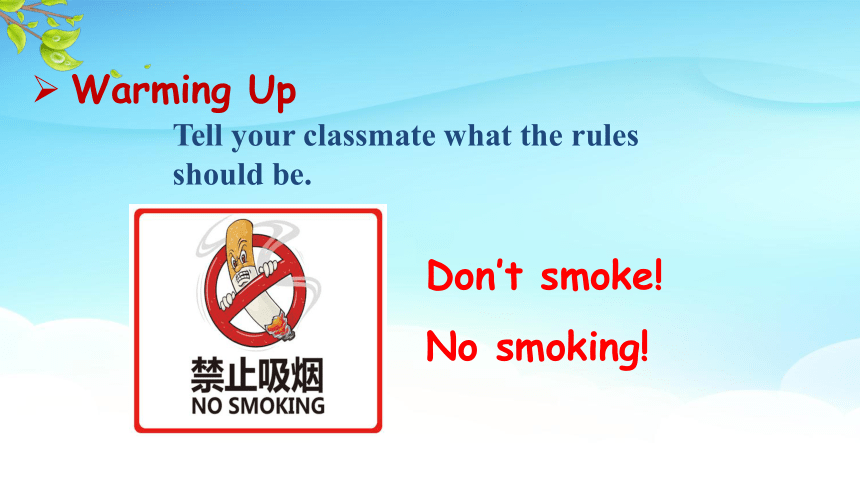
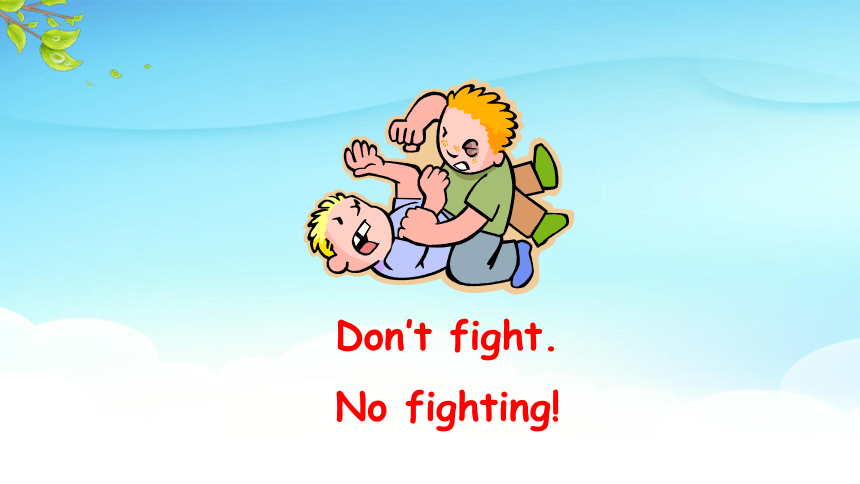
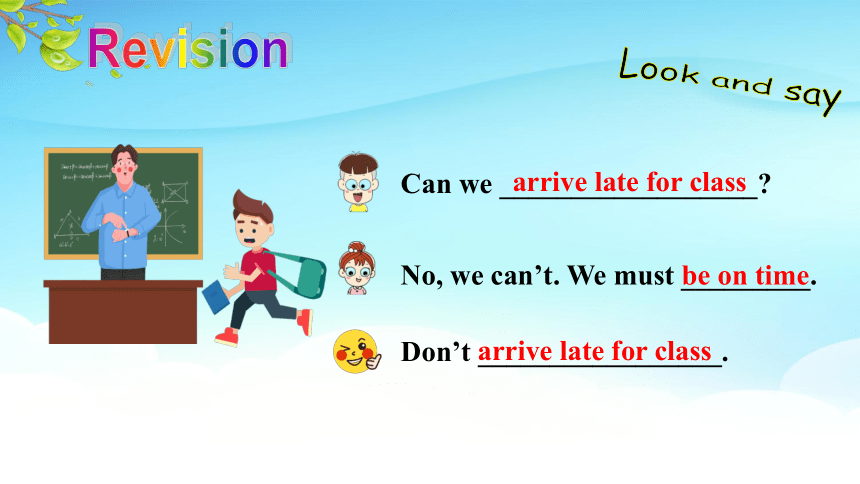
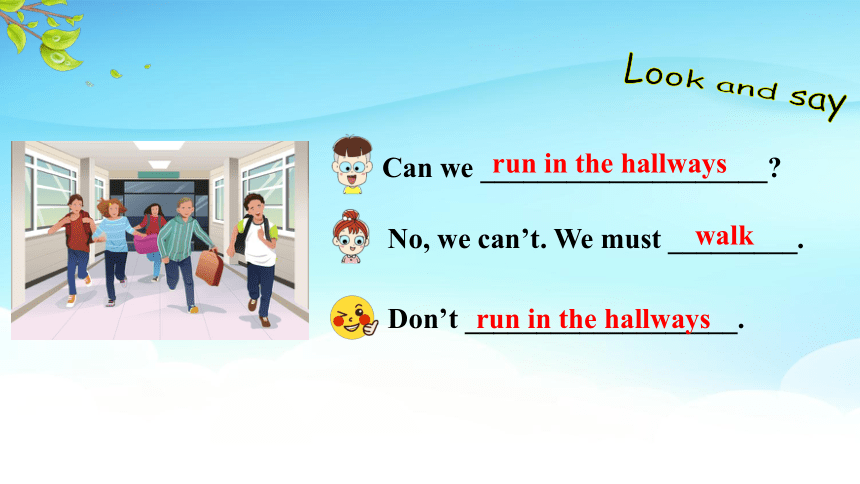
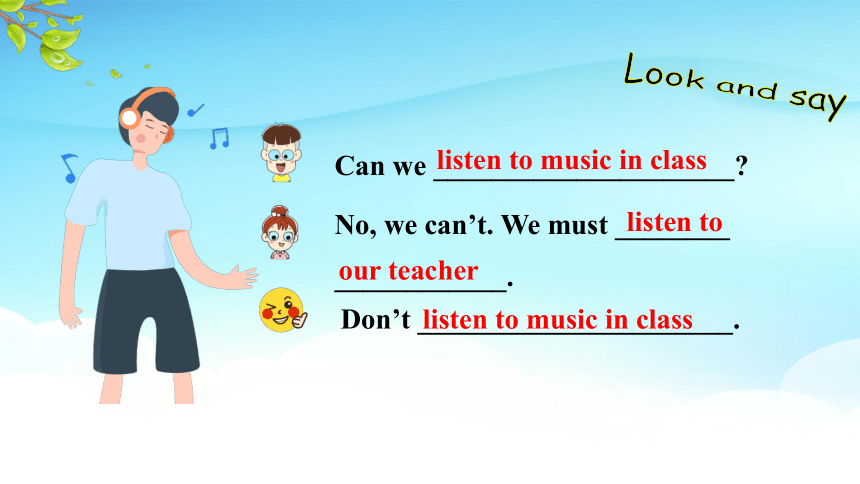
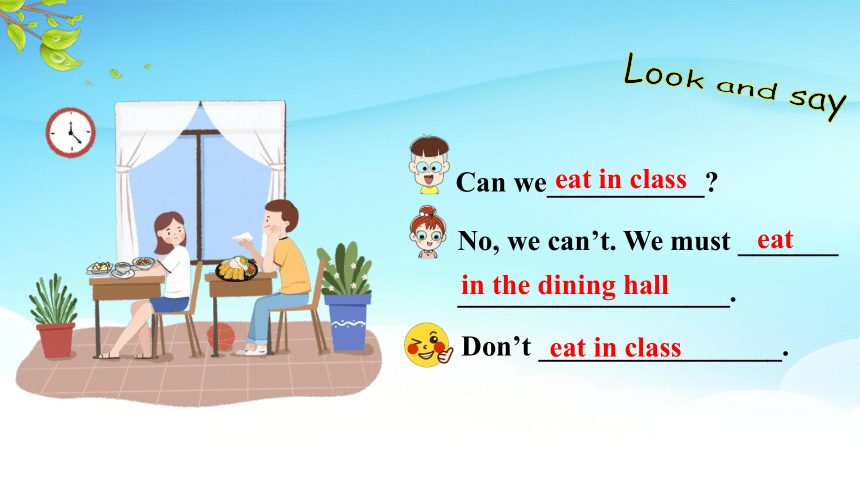
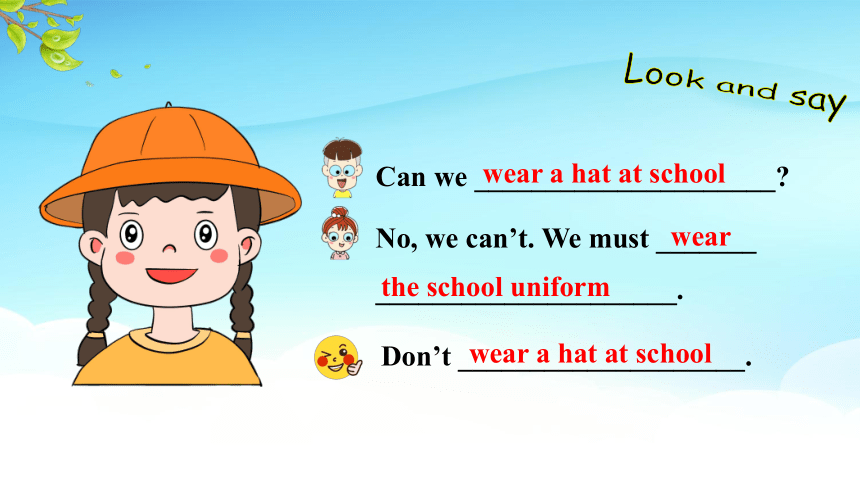
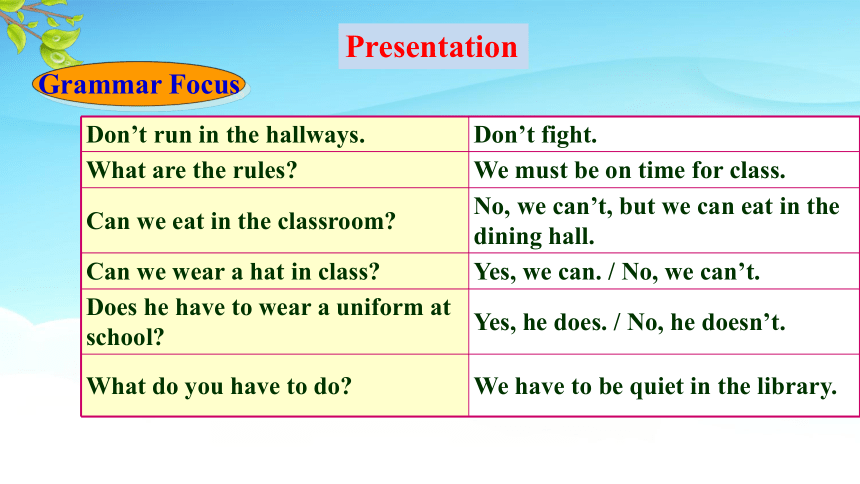
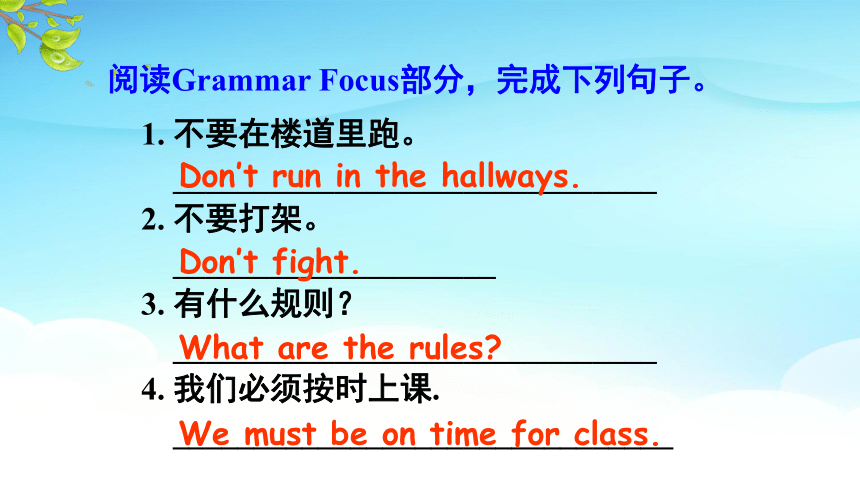
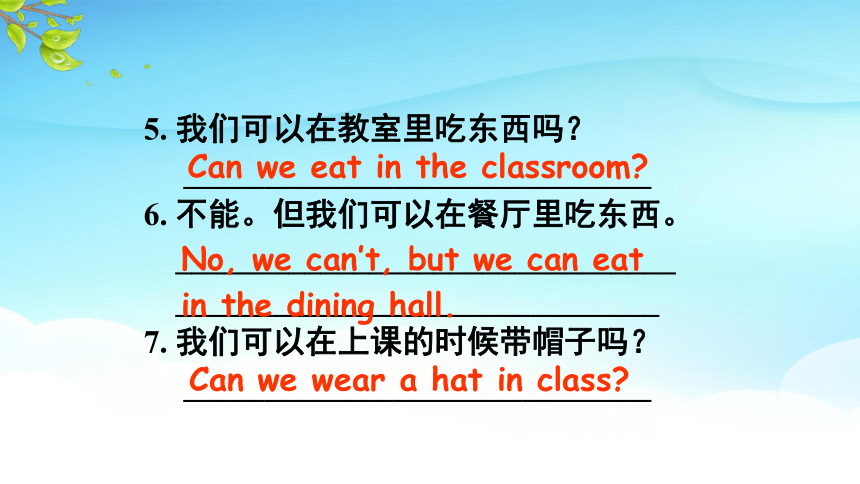
文档简介
(共42张PPT,无音频)
Section
A
(Grammar
Focus-3c)
Unit
4
Don't
eat
in
class.
学习目标
Key
words
&
phrases:
in
the
hallways;
be
on
time
for;
library
rules;
dream
school;
don't
have
to.
Key
sentences:
1.
We
must
be
on
time
for
class.
2.
Can
we
wear
a
hat
in
class?
3.
Does
he
have
to
wear
a
uniform
at
school?
To
learn
the
imperatives
and
some
modal
verbs.
Don’t
smoke!
No
smoking!
Warming
Up
Tell
your
classmate
what
the
rules
should
be.
Don’t
fight.
No
fighting!
Look
and
say
Revision
Can
we
__________________?
Don’t
_________________.
No,
we
can’t.
We
must
_________.
arrive
late
for
class
be
on
time
arrive
late
for
class
Look
and
say
Can
we
____________________?
Don’t
___________________.
No,
we
can’t.
We
must
_________.
run
in
the
hallways
walk
run
in
the
hallways
Look
and
say
Can
we
_____________________?
Don’t
______________________.
No,
we
can’t.
We
must
________
____________.
listen
to
music
in
class
listen
to
our
teacher
listen
to
music
in
class
Look
and
say
Can
we___________?
Don’t
_________________.
No,
we
can’t.
We
must
_______
___________________.
eat
in
class
in
the
dining
hall
eat
eat
in
class
Look
and
say
Can
we
_____________________?
Don’t
____________________.
No,
we
can’t.
We
must
_______
_____________________.
wear
a
hat
at
school
wear
the
school
uniform
wear
a
hat
at
school
Presentation
Grammar
Focus
Don’t
run
in
the
hallways.
Don’t
fight.
What
are
the
rules?
We
must
be
on
time
for
class.
Can
we
eat
in
the
classroom?
No,
we
can’t,
but
we
can
eat
in
the
dining
hall.
Can
we
wear
a
hat
in
class?
Yes,
we
can.
/
No,
we
can’t.
Does
he
have
to
wear
a
uniform
at
school?
Yes,
he
does.
/
No,
he
doesn’t.
What
do
you
have
to
do?
We
have
to
be
quiet
in
the
library.
1.
不要在楼道里跑。
______________________________
2.
不要打架。
____________________
3.
有什么规则?
______________________________
4.
我们必须按时上课.
_______________________________
阅读Grammar
Focus部分,完成下列句子。
Don’t
fight.
Don’t
run
in
the
hallways.
What
are
the
rules?
We
must
be
on
time
for
class.
5.
我们可以在教室里吃东西吗?
_____________________________
6.
不能。但我们可以在餐厅里吃东西。
_______________________________
______________________________
7.
我们可以在上课的时候带帽子吗?
_____________________________
Can
we
wear
a
hat
in
class?
No,
we
can’t,
but
we
can
eat
in
the
dining
hall.
Can
we
eat
in
the
classroom?
8.
他在学校里必须穿校服吗?
_________________________________________
9.
是的,必须。/
不,不必。
_________________________________
10.
你们必须做什么?
_______________________________
11.
在图书馆里我们必须保持安静。
____________________________________
Yes,
he
does.
/
No,
he
doesn’t.
Does
he
have
to
wear
a
uniform
at
school?
What
do
you
have
to
do?
We
have
to
be
quiet
in
the
library.
一、祈使句
1.
用法:一般以动词原形开头,表示请
求、命令、劝说、警告等。在祈使句
中,通常省略句子主语第二人称you。
探究乐园
2.
句子结构
(1)
肯定句:__________+
其他
在餐厅里吃东西。
________________________________
在音乐教室里听音乐。
________________________________
骑自行车去上学。
________________________________
Ride
the
bike
to
school.
Eat
in
the
dining
hall.
动词原形
Listen
to
music
in
the
music
room.
(2)
否定句:
_____
+
_________+
其他
不要和同学们打架。
_______________________________
不要在教室里打篮球。
________________________________
Don’t
fight
with
your
classmates.
Don’t
play
basketball
in
the
classroom.
Don’t
动词原形
以let引起的句子
____+
sb.+动词原形
让我们步行去上学吧。
___________________
(4)
No
+
动词-ing形式。表示“禁止、规劝”
禁止停车!No
Parking.
禁止吸烟!No
Smoking.
Let
Let’s
walk
to
school.
其他类型的否定祈使句
(1)
No+v-ing!
/
No+名词!
No
fishing!
禁止钓鱼!
No
parking!
禁止停车!
No
photos!
禁止拍照!
(2)
never
代替don’t
来加强语气。
Never
give
up!
决不放弃!
3a
Write
the
rules
for
the
school
library.
Library
Rules
1.
____________________________
2.
____________________________
3.
____________________________
4.
____________________________
Don’t
talk.
1
2
3
4
Don’t
eat
in
the
library.
Don’t
listen
to
music
in
the
library.
Don’t
take
photos
in
the
library.
wear
a
hat?
Listen
to
music?
Eat?
Do
we
have
any
library
rules
in
our
school?
Ask
and
answer
in
pairs.
Do
you
have
to...
in
the
library?
Yes,.../No,...
Be
quiet?
Pair
work
3b
Use
the
words
to
make
questions
about
the
rules.
Then
write
answers
according
to
your
school.
Q:
Does
she
have
to
be
quiet
in
the
library?
(she/have
to/in
the
library)?
A:
Yes,
she
does.
Be
quiet?
Eat?
Q:__________________________________
(he/have
to/in
the
dining
hall)?
A:__________________________________
Does
he
have
to
eat
in
the
dinning
hall?
Yes,
he
does.
Q:_________________________________(we/can/in
the
hallways)?
A:_________________________________
Listen
to
music?
Can
we
listen
to
music
in
the
hallways?
No,
we
can’t.
Wear
a
hat?
Q:_________________________________(we/can/in
the
classroom)?
A:_________________________________
Can
we
wear
a
hat
in
the
classroom?
No,
we
can’t.
the
students/have
to/clean
classroom/every
day
she/have
to/be
at
home/before
8
p.m.
she/have
to/do
morning
reading/every
day
we/can/arrive
at
school/late
Make
more
conversations
using
these
words.
3c
Make
up
five
cool
rules
for
your
dream
school.
Share
your
rules
with
the
class.
Your
classmates
vote
for
the
Coolest
School!
1.We
can
eat
in
class.
2.We
don’t
have
to
come
to
school
every
day.
3.
...
At
my
dream
school,
we
don’t
have
to
come
to
school
every
day.
We...
Report
At
my
dream
school,
we
don’t
have
to
come
to
school
every
day.
We
can
eat
in
the
classroom.
We
can
listen
to
music
in
class.
We
don’t
have
to
do
homework.
We
don’t
have
to
wear
school
uniforms
at
school.
Make
our
school
rules
Dear
students:
In
order
that
we
can
have
a
good
environment
(环境)
,
we
should
have
some
rules
in
our
school.
Here
are
some
suggestions.
We
hope
that
all
of
us
can
have
a
look
at
them.
1.
Don’t
sleep
in
class.
2.
Clean
the
classroom
every
day.
3.
__________________________
4.
__________________________
5.
__________________________
6.
__________________________
Yours
____
have?to?的用法
have
to意思是“必须、不得不”,
它侧重于
客观上的必要和外界的权威。
1)
结构:主语+have?to+动词原形+其他
(一般现在时,
主语是第三人称单数时,
用has?to;句子是过去时,用had?to。)
如:
Language
points
We?have?to?wear?sneakers?for?gym?class.?
在体育课上,
我们必须穿运动鞋。
Tom?has?to?practice?the?guitar?every?day.?
汤姆每天必须练习弹吉它。
I?had?to?get?up?at?5:00?am?last?Monday.?
上周一,
我不得不早上5点起床。
2)
否定形式:
主语+don’t?have?to+动词原形+其他(一般现在时,
主语是第三人称单数时,用doesn’t?have?to;句子是过去时,用
didn’t?have?to)
e.g.
Nick?doesn’t?have?to?wear?a?uniform.
?
尼克不必穿校服。
We?didn’t?have?to?do?our?homework?at?once.?
我们不必马上完成作业。
3)
疑问句:Do
(Does
或
Did)+主语+
have?to?+动词原形+其他
如:
--Do?you?have?to?stay?at?home?on?weekends??
--Yes,?I?do.?/?No,?I?don’t.?
周末你必须待在家里吗?
是的,
我必须。/
不,
我不必。
Did?he?have?to?go?to?bed?by?11:00?last?night??
昨晚,
他不得不11点上床睡觉吗??
Ⅰ.用所给单词的适当形式填空。
1.
Don’t
________(listen)
to
music
in
the
library.
2.
Do
we
have
to
________(clean)
the
room
every
day?
3.
You
can’t
________(wear)
sunglasses
in
the
classroom.
4.
Please
________(arrive)
at
school
on
time
(准时).
5.
John
is
often
late
for
_______
(class).
class
listen
clean
wear
arrive
Exercises
Ⅱ.将下面的句子改为祈使句,每空一词。
1.
You
can
come
in.
______
____,
please.
2.
I
can
help
you.
_____
me
______
you.
3.
You
can’t
eat
in
class.
_______
_____
in
class.
4.
You
can’t
be
late
for
school.
______
____
late
for
school.
5.
You
can’t
take
photos
here.
_____
photos
e
in
Let
help
Don’t
eat
Don’t
be
No
III.单项选择
1.David,
_______
make
trouble
at
school.
A.can’t
B.
don’t
C.
doesn’t
D.didn't
2.—Mom,
can
I
play
computer
games
this
evening?
—_______
your
homework
first,
and
then
we’ll
talk
about
it.
A.
Finishing
B.
Finish
C.
To
finish
D.
Finished
3.Buses
_______
stop
when
the
traffic
lights
turn
red.
A.
can
B.
may
C.
must
D.might
B
B
C
4.We
should
keep
quiet
in
the
library.
We
_____
speak
loudly
(大声地).
A.
must
B.
mustn’t
C.
can
D.
needn’t
5.I
_____
go
now,
or
I’ll
miss
my
train.
A.
can
B.
might
C.
must
D.
could
6.He
_____
stay
at
home,
because
it’s
raining
outside.
A.
have
to
B.
has
to
C.
must
D.
can’t
B
C
B
IV.句型转换(每空一词)
1.Talk
in
class.
(改为否定句)
______
______
in
class.
2.I
have
to
do
my
homework
after
school.
(对画线部分提问)
______
______
you
______
______
______
after
school?
3.We
have
to
listen
to
the
teacher.
(改为一般疑问句并作肯定回答)
______
we
______
______
listen
to
the
teacher?
______,
we
______.
Don’t
talk
Do
have
to
What
do
have
to
do
Yes
do
4.She
has
to
wear
the
uniform
at
school.
(改为一般疑问句,并作否定回答)
_____
she
_____
to
wear
the
uniform
at
school?
_____,
she
________.
5.We
can
run
in
the
hallways.
(改为否定句)
We
_____
run
in
the
hallways.
No
doesn't
Does
have
can’t
1.
我们必须按时到校。
We
must
arrive
at
school
___
_____.
2.
你能把你的电子游戏带到学校来吗?
Can
you
_____
your
computer
game
___
school?
on
time
bring
V.根据所给汉语完成英语句子,每空一词。
to
3.
周末迈克经常在外面吃饭。
Mike
often
____
________
on
weekends.
4.
星期天你不必早起。
You
_____
_____
___
get
up
early
on
Sundays.
5.
不要在走廊里乱跑。
Don’t
run
___
____
________.
eats
outside
don’t
have
to
in
the
hallways
中考链接
You
_________
always
be
careful
with
electricity
for
safety.
A.
must
B.
can
C.
mustn't
D.
can't
A
—
______
I
take
the
magazine
out
of
the
reading
room?
—
I’m
sorry
you
_______.
A.
Could;
couldn’t
B.
Must;
couldn’t
C.
will;
can’t
D.
May;
can’t
D
Summary
祈使句(重点为否定结构)
情态动词can表“许可”的用法(肯定及否定陈述,一般疑问句结构及肯定和否定回答)
Grammar
情态动词must的句型结构(仅限肯定陈述)
情态动词have
to的句型结构(肯定及否定陈述,一般疑问结构及肯定和否定回答)
Preview
the
new
words
and
phrases
in
Section
B(1a-1d).
Do
the
exercises
in
students’
book.
Section
A
(Grammar
Focus-3c)
Unit
4
Don't
eat
in
class.
学习目标
Key
words
&
phrases:
in
the
hallways;
be
on
time
for;
library
rules;
dream
school;
don't
have
to.
Key
sentences:
1.
We
must
be
on
time
for
class.
2.
Can
we
wear
a
hat
in
class?
3.
Does
he
have
to
wear
a
uniform
at
school?
To
learn
the
imperatives
and
some
modal
verbs.
Don’t
smoke!
No
smoking!
Warming
Up
Tell
your
classmate
what
the
rules
should
be.
Don’t
fight.
No
fighting!
Look
and
say
Revision
Can
we
__________________?
Don’t
_________________.
No,
we
can’t.
We
must
_________.
arrive
late
for
class
be
on
time
arrive
late
for
class
Look
and
say
Can
we
____________________?
Don’t
___________________.
No,
we
can’t.
We
must
_________.
run
in
the
hallways
walk
run
in
the
hallways
Look
and
say
Can
we
_____________________?
Don’t
______________________.
No,
we
can’t.
We
must
________
____________.
listen
to
music
in
class
listen
to
our
teacher
listen
to
music
in
class
Look
and
say
Can
we___________?
Don’t
_________________.
No,
we
can’t.
We
must
_______
___________________.
eat
in
class
in
the
dining
hall
eat
eat
in
class
Look
and
say
Can
we
_____________________?
Don’t
____________________.
No,
we
can’t.
We
must
_______
_____________________.
wear
a
hat
at
school
wear
the
school
uniform
wear
a
hat
at
school
Presentation
Grammar
Focus
Don’t
run
in
the
hallways.
Don’t
fight.
What
are
the
rules?
We
must
be
on
time
for
class.
Can
we
eat
in
the
classroom?
No,
we
can’t,
but
we
can
eat
in
the
dining
hall.
Can
we
wear
a
hat
in
class?
Yes,
we
can.
/
No,
we
can’t.
Does
he
have
to
wear
a
uniform
at
school?
Yes,
he
does.
/
No,
he
doesn’t.
What
do
you
have
to
do?
We
have
to
be
quiet
in
the
library.
1.
不要在楼道里跑。
______________________________
2.
不要打架。
____________________
3.
有什么规则?
______________________________
4.
我们必须按时上课.
_______________________________
阅读Grammar
Focus部分,完成下列句子。
Don’t
fight.
Don’t
run
in
the
hallways.
What
are
the
rules?
We
must
be
on
time
for
class.
5.
我们可以在教室里吃东西吗?
_____________________________
6.
不能。但我们可以在餐厅里吃东西。
_______________________________
______________________________
7.
我们可以在上课的时候带帽子吗?
_____________________________
Can
we
wear
a
hat
in
class?
No,
we
can’t,
but
we
can
eat
in
the
dining
hall.
Can
we
eat
in
the
classroom?
8.
他在学校里必须穿校服吗?
_________________________________________
9.
是的,必须。/
不,不必。
_________________________________
10.
你们必须做什么?
_______________________________
11.
在图书馆里我们必须保持安静。
____________________________________
Yes,
he
does.
/
No,
he
doesn’t.
Does
he
have
to
wear
a
uniform
at
school?
What
do
you
have
to
do?
We
have
to
be
quiet
in
the
library.
一、祈使句
1.
用法:一般以动词原形开头,表示请
求、命令、劝说、警告等。在祈使句
中,通常省略句子主语第二人称you。
探究乐园
2.
句子结构
(1)
肯定句:__________+
其他
在餐厅里吃东西。
________________________________
在音乐教室里听音乐。
________________________________
骑自行车去上学。
________________________________
Ride
the
bike
to
school.
Eat
in
the
dining
hall.
动词原形
Listen
to
music
in
the
music
room.
(2)
否定句:
_____
+
_________+
其他
不要和同学们打架。
_______________________________
不要在教室里打篮球。
________________________________
Don’t
fight
with
your
classmates.
Don’t
play
basketball
in
the
classroom.
Don’t
动词原形
以let引起的句子
____+
sb.+动词原形
让我们步行去上学吧。
___________________
(4)
No
+
动词-ing形式。表示“禁止、规劝”
禁止停车!No
Parking.
禁止吸烟!No
Smoking.
Let
Let’s
walk
to
school.
其他类型的否定祈使句
(1)
No+v-ing!
/
No+名词!
No
fishing!
禁止钓鱼!
No
parking!
禁止停车!
No
photos!
禁止拍照!
(2)
never
代替don’t
来加强语气。
Never
give
up!
决不放弃!
3a
Write
the
rules
for
the
school
library.
Library
Rules
1.
____________________________
2.
____________________________
3.
____________________________
4.
____________________________
Don’t
talk.
1
2
3
4
Don’t
eat
in
the
library.
Don’t
listen
to
music
in
the
library.
Don’t
take
photos
in
the
library.
wear
a
hat?
Listen
to
music?
Eat?
Do
we
have
any
library
rules
in
our
school?
Ask
and
answer
in
pairs.
Do
you
have
to...
in
the
library?
Yes,.../No,...
Be
quiet?
Pair
work
3b
Use
the
words
to
make
questions
about
the
rules.
Then
write
answers
according
to
your
school.
Q:
Does
she
have
to
be
quiet
in
the
library?
(she/have
to/in
the
library)?
A:
Yes,
she
does.
Be
quiet?
Eat?
Q:__________________________________
(he/have
to/in
the
dining
hall)?
A:__________________________________
Does
he
have
to
eat
in
the
dinning
hall?
Yes,
he
does.
Q:_________________________________(we/can/in
the
hallways)?
A:_________________________________
Listen
to
music?
Can
we
listen
to
music
in
the
hallways?
No,
we
can’t.
Wear
a
hat?
Q:_________________________________(we/can/in
the
classroom)?
A:_________________________________
Can
we
wear
a
hat
in
the
classroom?
No,
we
can’t.
the
students/have
to/clean
classroom/every
day
she/have
to/be
at
home/before
8
p.m.
she/have
to/do
morning
reading/every
day
we/can/arrive
at
school/late
Make
more
conversations
using
these
words.
3c
Make
up
five
cool
rules
for
your
dream
school.
Share
your
rules
with
the
class.
Your
classmates
vote
for
the
Coolest
School!
1.We
can
eat
in
class.
2.We
don’t
have
to
come
to
school
every
day.
3.
...
At
my
dream
school,
we
don’t
have
to
come
to
school
every
day.
We...
Report
At
my
dream
school,
we
don’t
have
to
come
to
school
every
day.
We
can
eat
in
the
classroom.
We
can
listen
to
music
in
class.
We
don’t
have
to
do
homework.
We
don’t
have
to
wear
school
uniforms
at
school.
Make
our
school
rules
Dear
students:
In
order
that
we
can
have
a
good
environment
(环境)
,
we
should
have
some
rules
in
our
school.
Here
are
some
suggestions.
We
hope
that
all
of
us
can
have
a
look
at
them.
1.
Don’t
sleep
in
class.
2.
Clean
the
classroom
every
day.
3.
__________________________
4.
__________________________
5.
__________________________
6.
__________________________
Yours
____
have?to?的用法
have
to意思是“必须、不得不”,
它侧重于
客观上的必要和外界的权威。
1)
结构:主语+have?to+动词原形+其他
(一般现在时,
主语是第三人称单数时,
用has?to;句子是过去时,用had?to。)
如:
Language
points
We?have?to?wear?sneakers?for?gym?class.?
在体育课上,
我们必须穿运动鞋。
Tom?has?to?practice?the?guitar?every?day.?
汤姆每天必须练习弹吉它。
I?had?to?get?up?at?5:00?am?last?Monday.?
上周一,
我不得不早上5点起床。
2)
否定形式:
主语+don’t?have?to+动词原形+其他(一般现在时,
主语是第三人称单数时,用doesn’t?have?to;句子是过去时,用
didn’t?have?to)
e.g.
Nick?doesn’t?have?to?wear?a?uniform.
?
尼克不必穿校服。
We?didn’t?have?to?do?our?homework?at?once.?
我们不必马上完成作业。
3)
疑问句:Do
(Does
或
Did)+主语+
have?to?+动词原形+其他
如:
--Do?you?have?to?stay?at?home?on?weekends??
--Yes,?I?do.?/?No,?I?don’t.?
周末你必须待在家里吗?
是的,
我必须。/
不,
我不必。
Did?he?have?to?go?to?bed?by?11:00?last?night??
昨晚,
他不得不11点上床睡觉吗??
Ⅰ.用所给单词的适当形式填空。
1.
Don’t
________(listen)
to
music
in
the
library.
2.
Do
we
have
to
________(clean)
the
room
every
day?
3.
You
can’t
________(wear)
sunglasses
in
the
classroom.
4.
Please
________(arrive)
at
school
on
time
(准时).
5.
John
is
often
late
for
_______
(class).
class
listen
clean
wear
arrive
Exercises
Ⅱ.将下面的句子改为祈使句,每空一词。
1.
You
can
come
in.
______
____,
please.
2.
I
can
help
you.
_____
me
______
you.
3.
You
can’t
eat
in
class.
_______
_____
in
class.
4.
You
can’t
be
late
for
school.
______
____
late
for
school.
5.
You
can’t
take
photos
here.
_____
photos
e
in
Let
help
Don’t
eat
Don’t
be
No
III.单项选择
1.David,
_______
make
trouble
at
school.
A.can’t
B.
don’t
C.
doesn’t
D.didn't
2.—Mom,
can
I
play
computer
games
this
evening?
—_______
your
homework
first,
and
then
we’ll
talk
about
it.
A.
Finishing
B.
Finish
C.
To
finish
D.
Finished
3.Buses
_______
stop
when
the
traffic
lights
turn
red.
A.
can
B.
may
C.
must
D.might
B
B
C
4.We
should
keep
quiet
in
the
library.
We
_____
speak
loudly
(大声地).
A.
must
B.
mustn’t
C.
can
D.
needn’t
5.I
_____
go
now,
or
I’ll
miss
my
train.
A.
can
B.
might
C.
must
D.
could
6.He
_____
stay
at
home,
because
it’s
raining
outside.
A.
have
to
B.
has
to
C.
must
D.
can’t
B
C
B
IV.句型转换(每空一词)
1.Talk
in
class.
(改为否定句)
______
______
in
class.
2.I
have
to
do
my
homework
after
school.
(对画线部分提问)
______
______
you
______
______
______
after
school?
3.We
have
to
listen
to
the
teacher.
(改为一般疑问句并作肯定回答)
______
we
______
______
listen
to
the
teacher?
______,
we
______.
Don’t
talk
Do
have
to
What
do
have
to
do
Yes
do
4.She
has
to
wear
the
uniform
at
school.
(改为一般疑问句,并作否定回答)
_____
she
_____
to
wear
the
uniform
at
school?
_____,
she
________.
5.We
can
run
in
the
hallways.
(改为否定句)
We
_____
run
in
the
hallways.
No
doesn't
Does
have
can’t
1.
我们必须按时到校。
We
must
arrive
at
school
___
_____.
2.
你能把你的电子游戏带到学校来吗?
Can
you
_____
your
computer
game
___
school?
on
time
bring
V.根据所给汉语完成英语句子,每空一词。
to
3.
周末迈克经常在外面吃饭。
Mike
often
____
________
on
weekends.
4.
星期天你不必早起。
You
_____
_____
___
get
up
early
on
Sundays.
5.
不要在走廊里乱跑。
Don’t
run
___
____
________.
eats
outside
don’t
have
to
in
the
hallways
中考链接
You
_________
always
be
careful
with
electricity
for
safety.
A.
must
B.
can
C.
mustn't
D.
can't
A
—
______
I
take
the
magazine
out
of
the
reading
room?
—
I’m
sorry
you
_______.
A.
Could;
couldn’t
B.
Must;
couldn’t
C.
will;
can’t
D.
May;
can’t
D
Summary
祈使句(重点为否定结构)
情态动词can表“许可”的用法(肯定及否定陈述,一般疑问句结构及肯定和否定回答)
Grammar
情态动词must的句型结构(仅限肯定陈述)
情态动词have
to的句型结构(肯定及否定陈述,一般疑问结构及肯定和否定回答)
Preview
the
new
words
and
phrases
in
Section
B(1a-1d).
Do
the
exercises
in
students’
book.
同课章节目录
- Unit 1 Can you play the guitar?
- Section A
- Section B
- Unit 2 What time do you go to school?
- Section A
- Section B
- Unit 3 How do you get to school?
- Section A
- Section B
- Unit 4 Don't eat in class.
- Section A
- Section B
- Unit 5 Why do you like pandas?
- Section A
- Section B
- Unit 6 I'm watching TV.
- Section A
- Section B
- Review of Units 1-6
- Unit 7 It's raining!
- Section A
- Section B
- Unit 8 Is there a post office near here?
- Section A
- Section B
- Unit 9 What does he look like?
- Section A
- Section B
- Unit 10 I'd like some noodles.
- Section A
- Section B
- Unit 11 How was your school trip?
- Section A
- Section B
- Unit 12 What did you do last weekend?
- Section A
- Section B
